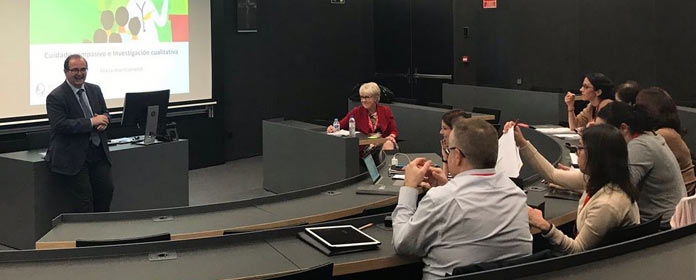Qualitative research is an ally for health professionals in the advancement of compassionate care
The ICS’s ATLANTES Program organized a course at the University’s Madrid campus on this issue. There, University of British Columbia researcher Carole Robinson presented.

FOTO: Cedida
Qualitative research can help healthcare professionals advance compassionate care. In order to familiarize them with these issues and their potential impact on clinical practice, the ATLANTES Program of the Institute for Culture and Society at the University of Navarra held a course at its Madrid campus.
The organizing team maintains that clinical reality is complex: healthcare professionals treat patients who face health situations that shape their lives and those of their loved ones. They also note that the contexts in which people live and the meaning they give to their personal experiences influence how they manage and behave during illness.
In light of this, ATLANTES researchers emphasize how important it is for healthcare professionals to provide the compassionate care their patients require. This type of care can be understood, in their opinion, as a dynamic process that recognizes individuality and seeks to establish a relationship between the patient and the healthcare professional.
In this relationship, knowledge, emotions, strengths, intuitions and suffering are involved, which calls healthcare professionals to act with warmth and empathy, and provide individual attention.
"Compassionate care is a foundation of palliative care," according to Carole Robinson, a professor at the University of British Columbia (Canada) and the course’s keynote speaker. "It involves active care that respects and understands the patient as a whole person and their family. So we must talk about attention focused on the person and the family."
The most important thing for patients and their familiesAccording to the expert, compassionate care "focuses on what is most important to patients and their families," such that "this care satisfies their needs in a meaningful way."
Regarding reflections from the course, Robinson points out that qualitative research can be an ally for compassionate care because "it contributes to knowledge of people’s experiences" and "provides evidence that supports our understanding and our own being as healthcare professionals."
As she notes, although many different qualitative research methods exist, they all implement "conversations with people about their experiences" with the idea that healthcare workers can understand them better.
"Obviously, each human being is unique and we must always take this into account, but to reach a more general understanding of, for example, what patients believe compassionate attention is and their experience in this regard, research allows us to better focus on our relationship style and provide said care," she concludes.




